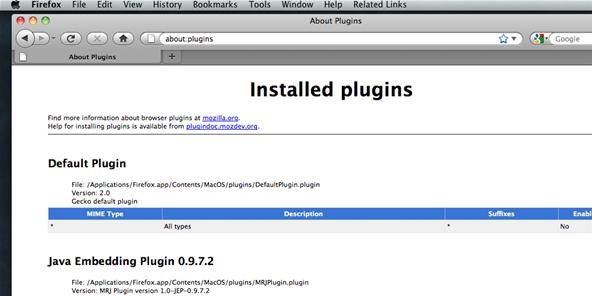
Support for plugins is being phased out, as of 2018 Flash is the only plugin still supported to some degree. Typical examples are Flash or Silverlight.
FIREFOX PLUGINS CODE
The plugin can either draw some content for the tag (windowed plugins) or stay in background and simply provide an API for the webpage's JavaScript code to use (windowless plugins).

Such plugins are binary libraries that are invoked if a website uses an or tag with a type that is handled by the plugin. Plugin: means NPAPI plugins that are supported by all browsers but Internet Explorer (the latter uses the proprietary ActiveX technology instead). As of Firefox 57, all extensions have to be based on the WebExtensions API. Recently the Add-on SDK has been added as an alternative way to generate simple extensions, it uses HTML instead of XUL but limits the ways in which the browser's user interface can be extended significantly.
FIREFOX PLUGINS FULL
They have full access to XPCOM and can provide their own XPCOM components as well. Extensions typically use XUL and CSS for their user interface as well as JavaScript for dynamic actions. This includes for example extensions, themes, plugins, dictionaries, language packs, search engines.Įxtension: a package extending browser functionality, the extension format used by Firefox works in Gecko-based browsers only. You can use a different browser profile for such a dedicated browser.Add-on: essentially anything that can be installed into the browser. Never use an old browser for public web pages, since the browser may have known, exploitable flaws. A typical use case may be an internal system which needs a Java plugin but is otherwise secured. You can still use an old and unsupported browser, but it may contain flaws and vulnerabilities which won’t be fixed. This will be the final option when Firefox 52 ESR reaches its end of life. To choose the default in Fedora Workstation, go to the Settings control panel, and select Details, Default Applications. You can have more than one browser installed. For instance, they may default to unencrypted HTTP, or fill encrypted pages with links that go back to the unencrypted site. Many sites on the web offer some limited support for encryption over HTTPS, but make it difficult to use. It also updates itself automatically when a new release is available. HTTPS Everywhere is produced as a collaboration between The Tor Project and the Electronic Frontier Foundation. You can then register it as a default browser.
FIREFOX PLUGINS ARCHIVE
Download and unpack the tar archive somewhere in your home directory and launch the browser. The Firefox 52 ESR binary package is provided from Mozilla site. However, at the end of this year Firefox 52 ESR ( Extended Support Release) is planned to be discontinued.


This is the official to run NPAPI plugins by Firefox now. Then right click anywhere on the option list and add a new Boolean option named plugin.load_flash_only and set it to false.īe aware this entry could be removed anytime without further warning, and is strictly unofficial. In Firefox, enter about:config in the location bar, and confirm the warning dialog. Firefox 52 allows you to override the plugin block using a preference setting in about:config. Fortunately, Fedora users still have options to bypass that plugin ban. The exception is Flash, but Firefox will remove its support in the future, too. The stock Firefox 52 browser disables these components. Some well known NPAPI plugins are Flash, Java, and the GNOME Shell web extension. NPAPI plugins are binary components integrated to the browser. Mozilla decided to stop supporting NPAPI plugins for Firefox browser two years ago.


 0 kommentar(er)
0 kommentar(er)
